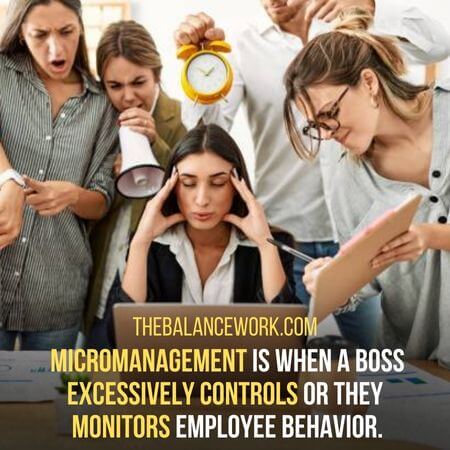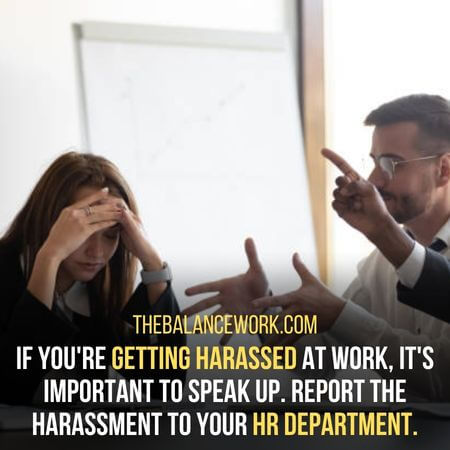Why do employees hate their boss? Bosses know why, and it’s usually because they’re not doing their jobs right.
Bosses need to lead by example and be the type of person their employees can look up to.
Why Do Employees Hate Their Boss?
There can be many reasons why employees hate their boss. And no matter how good of a leader you think you are, there’s always room for improvement.
Here are 15 reasons your employees might not be happy with your leadership style:
1. Micro-Management:
The top reason employees say they hate their boss is because of micromanagement. Micromanagement is when a boss excessively controls or monitors employee behavior.
This usually leads to employees feeling suffocated. And they cannot do their jobs to the best of their abilities.
Any time you find yourself wanting to control every little thing your employees do, step back.
And ask yourself if it’s really necessary to get the job done.

To overcome micromanagement, try the following tips:
– Set clear expectations for your employees. This way, they will better understand what is expected of them.
– Allow your employees to make mistakes. It’s the only way they will learn and grow.
– Give your employees some autonomy when it comes to their work. This will show that you trust them to do their job well.
2. Lack Of Communication:
When bosses fail to communicate with their employees, it can lead to many problems. Unfortunately, this can be a two-way street.
Employees might not know what’s expected of them. Or they might not be aware of important changes happening in the company.
Lack of communication can also make employees feel like they’re not valued. If you’re not talking to them, it can feel like you don’t care about their opinions or suggestions.
And whenever there is a problem, good communication is key to solving it. Your employees need to feel they can come to you with their concerns.
Otherwise, they’ll start looking for a job elsewhere. Because they want to work for a boss who respects them and values their opinion.
Also, giving employees the tools they need to do their job well is important. It can be very frustrating if they don’t have the resources they need.
3. Unfair Treatment:
While it’s important to be consistent with employees, it’s also important to be fair. If you’re not, they’ll start to resent you.
For example, you’re always singling out one employee for criticism. But others get away with making the same mistakes; that’s not fair.
Or if you give some employees privileges that others don’t have, that can create a feeling of unfairness.
For instance, when employees see that some people can come in late or leave early. While others have to adhere to a strict schedule, it creates a feeling of inequality.
Little or big, these double standards will breed resentment among your employees.
At the end of the day, employees want to be fairly treated. If they feel you’re not playing by the same rules, they’ll start to hate you.
4. You’re A Know-It-All:
No one likes a boss who thinks they know everything. It’s arrogant, and it makes you seem out of touch.
Your employees are the ones doing the work. So they probably have a pretty good understanding of what’s going on.
If you act like you know more than them, they’ll start to resent you. Also, they’ll be less likely to come to you with problems or suggestions.
A know-it-all boss is the last thing your employees want. To overcome this, try to listen more and talk less.
Some tips to avoid this include:
– Encourage employees to share their ideas
– Make it clear that you value their input
– Create an open and collaborative environment
This way, you can avoid the appearance of being a know-it-all and keep your employees happy.
5. Are You A Hothead?
Are you the boss who yells and screams when things don’t go your way? If yes, you’re not going to have a happy workforce.
Employees don’t want to work for someone unpredictable and have a short temper. So they’ll start looking for ways to avoid you and will jump ship at the first opportunity.
If you’re struggling to keep your cool, take a step back and breathe. Count to 10 before you say anything. And try to see things from your employees’ perspective.
They’re more likely to respect you if you’re level-headed. And if you can handle difficult situations without losing your temper.
It may be clear that the boss does not have the best interest of his employees at heart. It will breed contempt and resentment.
Make an effort to build them up and praise them when they do something well. Show them that you’re on their side and want them to succeed.
6. Do You Take Credit For Your Employees’ Work?
Do you take credit for your employees’ hard work? If so, they probably can’t stand you.
Being a leader and having your employees look up to you is great. But there’s a line between being a leader and being a credit hog.

If you’re constantly taking credit for your employees’ work, they’ll start to resent you. They’ll feel like you’re not giving them the credit they deserve.
Make sure you give your employees the credit they deserve. If they do a great job, tell them so. Let them know that you appreciate their hard work.
7. Unapproachable Boss:
Is your door always closed? Do you keep your door closed all the time? If so, your employees might think you’re unapproachable.
They might think you’re not interested in hearing their problems or concerns.
Make sure you keep your door open. Let your employees know that you’re available to talk to them.
You can follow up with them later if you’re busy. But at least let them know that you’re available to talk.
You can either keep your door open or have an open-door policy. That means you’re available to talk to your employees whenever they need to talk to you.
Encourage your employees to come to you with their problems. Let them know that you’re there to help them.
8. Making Employees Uncomfortable:
You might not mean to, but sometimes you can make your employees feel uncomfortable.
For example, they will feel uncomfortable if you’re always yelling at them.
Or, if you’re always talking about your personal life, they might feel like you’re oversharing.
Try to be aware of how your employees are feeling. Try to change your behavior if you think you’re making them uncomfortable.
For instance, if you’re always yelling, try to speak to them in a calm voice.
Or rather than talking about your personal life, ask them about their lives.
Making an effort to make your employees comfortable will go a long way. And if you don’t, they’ll start to hate you.
9. Criticism Without A Solution:
If you’re constantly critiquing your employees but never offering a solution, that’s wrong.
There are two types of criticism: constructive and destructive.
Constructive criticism is meant to help the person improve. But, at the same time, destructive criticism is meant to tear them down.
If you criticize someone, make sure you’re doing it constructively. Otherwise, your employees will start to hate you.
Some ways to do this are by:
– Offering solutions
– Being specific, and
– Avoiding personal attacks.
And even when offering constructive criticism, be aware of how you’re doing it.
Are you coming across as harsh or rude? If so, your employees will start to resent you.
The best way to criticize is by using the “sandwich method.”
Start with a compliment, give your criticism, and end with another compliment.
This way, your employees will know you’re not just out to get them. But they will know that you want to help them improve.
10. No Clear Direction:
How can you expect your employees to follow you if you don’t know where you’re going?
Be clear about what the goals and objectives of the company are.
Your employees should know what they need to do to help the company achieve its goals.

Your employees should also know how their work contributes to the company’s overall success.
For instance, your company’s goal is to increase sales by 10% this year. Each employee should know how their work will help contribute to that goal.
Also, a clear direction includes having a clear vision for the future.
Your employees should know where the company is heading. And what their role will be in helping to get it there.
11. You Break Your Promises:
Your employees need to be able to trust you. If you make a promise, you need to be sure to keep it.
For instance, you tell your employees that they will receive a raise if they meet certain goals. Therefore, you must ensure they get the raise if they meet those goals.
If you don’t, it will be very difficult for them to trust you in the future.
Promise and trust are closely related. If you break your promises, it will be difficult for your employees to trust you.
Bosses have to be honest with their employees. When you make a mistake, own up to it. Admit it and try to make things right.
Your employees will respect you more if you’re honest with them. And it brings us to the next point…
12. You Don’t Trust Your Employees:
If you don’t trust your employees, it will be difficult for them to trust you. You need to trust your employees if you want them to trust you.
You may subconsciously be doing things that make your employees feel untrusted.
For example, you’re always looking over their shoulder. As a result, they may feel you don’t trust them to do their job properly.
Or if you micromanage them, they may feel like you don’t trust them to make decisions on their own.
Consider whether you may be doing things that make your employees feel untrusted. If so, try to stop doing those things.
For instance, if you micromanage them, delegate more tasks to them. And give them more responsibility.
13. Unappreciative Boss:
An unappreciative boss is one of the main reasons why employees hate their boss.
Your employees may feel like you don’t appreciate them or their work.
This can be a major problem because it can make your employees feel devalued and unimportant.
If you want to keep your employees happy, you must show appreciation for their work.
There are many ways to show appreciation, such as giving:
– Verbal praise
– Written recognition
– Rewards and recognition programs
– Promotions and raises
14. Harassment:
Harassment is another major reason why employees hate their bosses. No one wants to be harassed at work. Whether it’s by their boss or by a co-worker.
If you’re getting harassed at work, it’s important to speak up. First, report the harassment to your HR department.
You should also create a hostile work environment complaint. Do so if the harassment is coming from your boss.

When you make a complaint, be sure to document everything. For example, include the incident’s date, time, and location.
You should also include the names of any witnesses.
15. When You’re Not a Priority:
Employees who feel like they’re not a priority will start to hate their boss.
Your employees should feel like they’re valuable to the company. If they don’t, they’ll look for other job opportunities.
Make sure you keep an open-door policy. Encourage your employees to come to you with any concerns or suggestions they have.
Also, be sure to give credit where it’s due. For example, if an employee does a great job, let them know.
Final Word:
So why do employees hate their boss? There are several reasons.
If you’re a boss, it’s important to be aware of these reasons. By doing so, you can make sure your employees don’t start to hate you.
Start by identifying the main reasons your employees might hate you. From there, take steps to ensure your employees feel valued and appreciated.
Doing so will create a better work environment for everyone involved.
Last Updated on 2 days by Eesha Khan
- Why Does My Boss Wink At Me? 6 Potential Reasons - October 5, 2023
- Is It Legal For Your Employer To Call Your Doctor? No, But… - October 4, 2023
- 12 Ways To Deal With A Low IQ Person - September 22, 2023